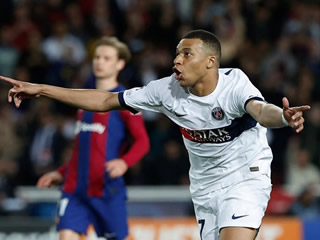Thumbs down to Blatter’s extra-time proposals
Posted Friday, September 10, 2010 by YAHOO Sport
PARIS (AP)—In 514 matches for club and country, German wunder-forward Oliver Bierhoff scored 226 times. Yet only once, Bierhoff says, did he celebrate by whipping off his jersey: when his left-footed golden goal made Germany the European champion in 1996.
That sudden-death winner against the Czech Republic, after just four minutes of extra time, was the first golden goal scored in a major international competition.
“For sure the most important goal in my career,” says Bierhoff, who is now team manager for Germany’s national side.
Czech goalkeeper Petr Kouba’s outstretched hands only managed to divert the shot against the inside of his left post. Czech players collapsed grief-stricken as Bierhoff tore away in shirt-waving joy in front of 76,000 spectators in Wembley Stadium.
“It’s strange,” Bierhoff said in a phone interview, trying 14 years later to pinpoint why that was the only time he felt compelled to go torso-naked for a goal. “Perhaps deep inside me I realized the game was over.”
No question: Because it delivered results with the brutal and sudden finality of a guillotine, the golden goal method of deciding football matches provided unforgettable moments of drama during its decade of use starting in 1993.
That doesn’t mean it should be revived ghoul-like from the grave now.
FIFA president Sepp Blatter’s suggestion is like putting a bottle of vinegar in the cupboard and hoping 10 years later that it will, somehow, have magically transformed into a vintage wine. It hasn’t.
Had this method been the answer to Blatter’s prayers and a consistent, widely appreciated antidote to dull football then FIFA wouldn’t have splashed the headline—“Footballing world cheers end of golden goal”—on its web site in 2004 when the sport’s rule-makers abolished it. For deciding matches deadlocked after 90 minutes, they instead reverted to a full 30 minutes of extra time followed, if necessary, by a penalty shoot-out.
Blatter, like many of us, was dismayed by the lack of ambition from some teams at the 2010 World Cup that played not to win games but rather to not lose. Naively, Blatter feels that tinkering with the rules might encourage more attacking football.
Nations like New Zealand, Algeria, Switzerland, Honduras, North Korea or Greece—which together scored a pathetic six goals between them in South Africa — cannot be conjured into attack-minded whirlwinds like Spain, Argentina or Germany with a tweak here or there. They don’t have the necessary talent or strength in depth and so instead play within their limitations.
Blatter can’t stop weaker teams from playing for draws or pulling 10 men back in hopes of keeping goals out until they can try their luck in a penalty shoot-out. His suggested alternative to golden goals—that shoot-outs be organized after 90 minutes of play instead of the current 120—is silly because it would merely mean that unambitious teams have to hang on for a shorter time they are rewarded with the lottery of penalties.
Consider the World Cup final. It would have been wrong had the Netherlands beaten Spain on penalties after playing so cynically and negatively for the first 90 minutes. Extra time allowed Spain to finally break down the Dutch and football justice to be done.
Because of the disparities in talent, there will always be dull games and teams at the World Cup. We can legitimately hope that future World Cups will be better without having to flip-flop back and forth between changing sets of rules. Let us also not forget that one reason put forth by some players and coaches for the restricted diet of goals in South Africa was the lightness of the World Cup ball that, at altitude, became hard to control. That should be easy for FIFA to remedy for Brazil in 2014.
Bigger priorities for FIFA should be concentrating on limiting the atrocious refereeing errors that marred some games in South Africa, including quickly accepting goal-line technology. Players might also be more inclined or able to attack if they weren’t being exhausted by over-strenuous seasons. That far trickier and complex problem is more worthy of FIFA’s utmost attention than asking committees to toy with golden goals or extra time.
“This would be much more important,” Bierhoff says of possibly lightening players’ commitments.
“The big players come to the tournaments very tired. It becomes more and more difficult for these Messis and Ronaldos to come fresh,” he says.
And reviving golden goals?
“It will change nothing,” he says.
Hardly a ringing endorsement from someone best remembered for scoring one.
Photos
More»Glam British athlete Lauryn Davey shows off bum
Wednesday April 17 2024[PICTURE SPECIAL] Barcelona 1-4 PSG (AGG 4-6)
Wednesday April 17 2024[PICTURE SPECIAL] Chelsea 6-0 Everton
Tuesday April 16 2024



Your Say